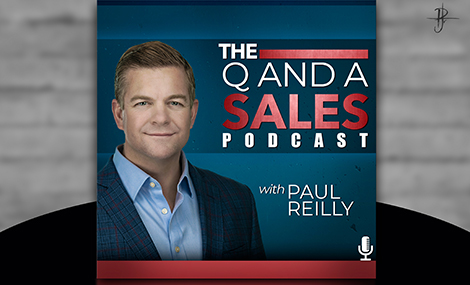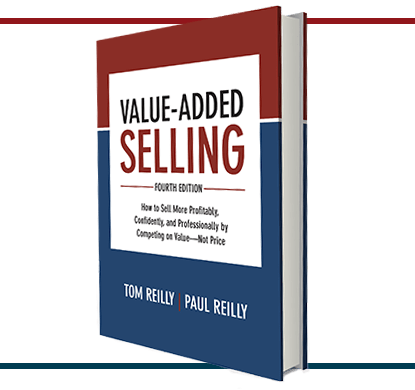Have you ever wondered what type of questions you should be asking? Paul shares seven key questions to help you generate a great discussion with prospects and customers.
Show Notes:
Questions help you understand the buyer’s needs and generate a good information exchange. It’s critical that salespeople ask the right questions the right way.
“Great questions cause the buyer to think…and speak.”
Prospects aren’t just buying products. They are also buying your company, and you, the salesperson. Ask the buyer what they expect along those three dimensions.
“Transport the buyer into the future.” A long-term question will help the buyer focus on outcomes, not price.
Whatever you do, don’t ask this question, “Is…?”
Gain an in-depth understanding of your competition. “Keep in mind that your toughest competitor could be a ‘do nothing.'”
Allow the buyer to dream and think bigger. This is by far one of my favorite questions to ask prospects. ‘What…?’
Remember to ask yourself a question to help you prepare for your meeting. “What do I give this prospect the opportunity to do tomorrow that they cannot do today?”
***
Our show is updated weekly with the questions you ask. So, please, go to the home page, subscribe, share it with your friends, but most importantly, ask the question that you want answered.
The Q and A Sales Podcast is edited by The Creative Impostor Studios.
Thank you for tuning in. Make it a big day.
http://www.theqandasalespodcast.com
What questions should I ask prospects?
(Transcribed from podcast)
Today we’ve got a good question.
What kind of questions should I be asking on my sales calls?
This is a question that came from a recent training program. It was a newer salesperson that came up and said, “When I am out there interacting with my customers and prospects, I’m really struggling to get a good information exchange. What advice do you have?”
We started talking about questions, and I was asking the salesperson what kind of questions they ask, and how they ask it. It became clear that the salesperson needed a little bit of coaching on what type of questions they should be asking. So, that’s what we’re going to focus on today.
Let’s look at why we need to ask questions first of all. Several reasons; the primary drive is to get information. We’re trying to gather information from our customer. We want to have a good information exchange. And, in order to have a good information exchange, we really need to ask good questions that cause our buyer to think and cause them to speak. We need them to feel engaged in the conversation. Good questions can do all of these things. When we looked at top-achieving salespeople, we found that they spend 38 percent of their selling time understanding the customer’s needs. They spend more time doing this than any other part of the sales call, so it goes to show you just how important listening actually is.
Top achievers ask the right question. They put the focus on the customer, and the right question will give the customer the opportunity to speak, which also gives the top achiever an opportunity to listen. We’re going to look at a few questions to help kick off this program.
Let’s look at the first question I’d recommend:
What’s important to you when making this buying decision?
This is a great question for several reasons. Number one – it helps reveal what’s truly important to that buyer. But, also, it gives you a chance to ask a follow-up question. When they say, “We need performance. That’s what really matters to us.”
“Okay, when we look at performance specifically, what are you looking for?” And that gives you a great follow-up question. You can dive deeper into what’s important to them.
That first question (what’s important to you when making this type of decision) let’s you know where their head is.
The next thing you want to do is ask some questions about their expectations. For example: “Mr. Prospect. What do you expect from our products, our company, and also me as your salesperson?” If you‘ve listened to previous episodes, you know that the product, the company, and the salesperson represents the three dimensions of value. It’s important that we understand the customer’s expectations in each one of these categories, because once we understand that expectation, we know what we need to exceed. And that’s always our goal; not just to meet that customer or prospect’s expectations, but to exceed that expectation. So, ask about the buyer’s expectations in those three categories: the product, the company, and the people.
This next question actually uses a prefacing statement before we ask it. The question here would be, “Mr. Prospect, or Ms. Prospect. Let’s look towards the end of this project (or campaign, or initiative). What does the ideal outcome look like to you?” This question transports that buyer into the future. And, when they’re thinking in the future, they’re thinking about outcomes. They’re concerned about what they’re going to achieve, what they’re going to gain, how it’s going to impact them and they’re not thinking about what they have to sacrifice to attain it. That’s why I love that question. It gets that buyer thinking long term and into the future.
The next question we want to look at: “Is price important to you?” I’m kidding! Don’t ask that question. It’s a terrible question! What do you think a buyer would say if you say, “Hey, is price important to you?”
“No. Go ahead and charge me as much as you want.”
Don’t ask that question, but this brings up a good point. You do kind of want to know how important price is to the customer. So, we can’t even ask that customer how important is price because by asking any question that focuses on price is going to focus the buyer’s attention on price. Rather than is price important to you, or, how important is price, just ask that buyer, “What is important to you?” “What is critical in making this decision?” Focus on that, not on price.
Let’s look at the next question:
How are you currently meeting your needs?
This question helps you understand who they’re currently working with. It helps bring in the competitive discussion, because we want to figure out who our competition is. Sometimes our competition is going to be another provider, another supplier, another equipment manufacturer. Or, our competition could be do nothing. We could be competing with a homegrown type of system or methodology for solving a problem that they have. So, our goal is to figure out who is the competition and how they’re currently meeting the customer’s needs.
Once we identify who the competitor is, we want to understand how satisfied they are. We might follow up that question with “What do you like or dislike about your current solution or your current methodology?”
Some people might ask, “Why would you ask what they like? Wouldn’t it reinforce their decision? Basically, they’re reselling themselves that they made a good decision.” I can understand that. But what we’re really going for here is that when people tell you what they like, that’s important to know, but it also means that they’re going to be more honest when they tell you what they dislike. When you give people an opportunity to tell you what they like, they’re more likely to be open and honest about what they dislike as well.
Ideally, when we’re talking to the customer they might say, “Here’s what I can’t stand about my current option,” or, “Here’s the most frustrating part about it.” We realize that they had some pain there. We’ve revealed some pain and so we want to dig a little deeper into that when they say, “We’re having some issues.”
“Would you elaborate on that? How did those issues impact you on this project?” Dig a little deeper just to get that dissatisfaction out there.
The next few questions we’re going to look at will help us understand what’s missing from their current solution. This question, I think, is great.
Mr. Prospect. If you were going into our business tomorrow, what would you offer customers that nobody else is offering?
These questions allow the buyer to dream, think bigger, think beyond just the normal day-to-day of what they’re running into. It gives them the chance to tell you that one thing that is missing. And, once you understand what that is, the buyer is admitting “Whatever I’m doing right now just isn’t enough to satisfy my complete needs.” This question allows us to dive a little bit deeper to figure out what is missing.
This next question is helping us understand how our solution, or the right solution, would impact them.
Ms. Prospect. If we could provide you with an ideal solution (or a better solution), how would that impact you on this project (in this area, or department)?
This question helps reveal the impact of your solution. That’s, again, what really gets buyers to make decisions is that impact—what they’re going to gain from it. This question focuses on the impact. In fact, once you ask this question, the buyer is restating your value proposition. They’re telling you, essentially, why they should buy your alternative. It’s a very powerful question. Again, that question is “If we could provide you with that ideal solution, how would that impact you?”
As we go through these questions—we gave you about six or seven questions to think about—I want to be clear about something; this is not a script. Scripts don’t work because buyers aren’t following the same script that you’re working from. We don’t use scripts while trying to sell. These questions serve as guide. And I would take some of them—make them your own, really research them, understand it, role-play it with your peers—but get comfortable asking good questions that generate that good discussion.
We have one bonus question that we wanted to go into. This is a question that we don’t just ask the buyer. It’s a question that we ask ourselves. This question will help you prepare as you go in and deliver your presentation.
What do you give the prospect an opportunity to do tomorrow that they cannot today?
This question helps reveal what we call the opportunity value of your solution. The next time you’re meeting with a prospect, throw that question out there.
“Ms. Prospect. You might be asking yourself, ‘What do we give you the opportunity to do tomorrow that you cannot do today?’ Well, let me explain what that is and how it could potentially impact your business.”
You’ve set up that question. It’s such a powerful question because it not only highlights what you give them the ability to do tomorrow, it also puts a spotlight on what they cannot do today. It’s a great question; it’s a very compelling question.
Remember these questions when you’re out there meeting with your prospects and with your customers.
Make it a big day!


